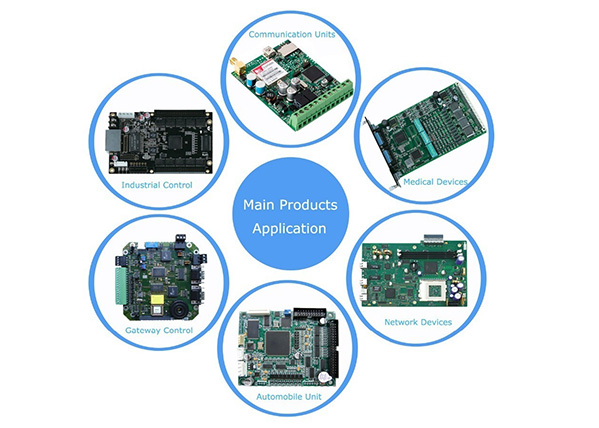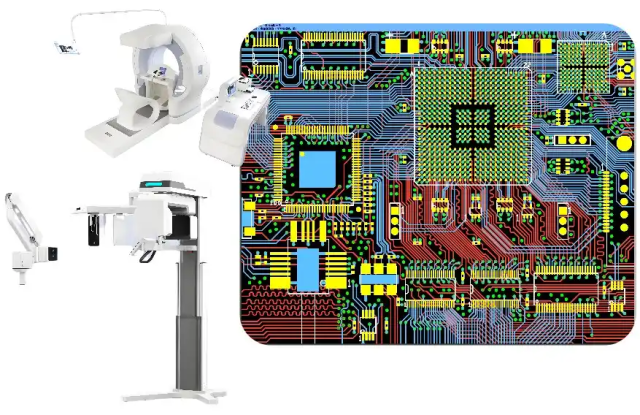Ensuring Long-Term RF Accuracy and Material Safety Through KKPCB’s Advanced PTFE Processing and Bio-Compatible Validation
In medical imaging, wearable diagnostics, and precision industrial sensing, RF signal stability and biocompatibility are not just performance indicators — they are safety-critical.
A 0.1 dB drift in an RF ablation system can alter treatment precision; a 0.05 dielectric shift in a wireless implant reader can lead to diagnostic errors.
For such ultra-sensitive environments, Rogers RO5880 PCB stands out due to its low-loss PTFE dielectric (Df = 0.0009) and non-reactive surface chemistry, offering both electromagnetic precision and biological inertness.
However, translating its intrinsic material potential into real-world reliability under sterilization, humidity, and long-term temperature cycling requires highly specialized process control — a field where KKPCB’s medical-RF manufacturing platform provides a critical advantage.

1. Why Dielectric and Bio-Stability Are Vital in Medical RF Platforms
In both medical and industrial systems, RF modules operate under continuous power exposure, frequent sterilization, and environmental variability.
Any change in dielectric constant or surface chemistry can lead to:
| Failure Mode | Root Cause | Result |
|---|---|---|
| Impedance drift | Moisture absorption / lamination stress | Mismatch & loss of calibration |
| Phase deviation | Dk instability with temperature | Signal distortion in phased systems |
| Surface degradation | Improper copper/PTFE bonding | Poor biocompatibility or corrosion |
RO5880’s PTFE base is chemically inert and hydrophobic, yet fabrication precision determines whether these benefits are preserved.
KKPCB has developed a multi-stage dielectric integrity protocol to ensure dielectric constancy even after hundreds of sterilization and operation cycles.
2. KKPCB’s RF Medical Manufacturing Framework
a. Controlled PTFE Surface Activation
-
Plasma treatment before copper adhesion ensures uniform bond strength without altering dielectric properties.
-
Verified with Fourier-Transform Infrared Spectroscopy (FTIR) to confirm no molecular degradation of PTFE.
b. Biocompatible Metallization Process
-
Utilization of ENIG / ENEPIG finishes with Ni thickness < 3 µm to meet ISO 10993 cytotoxicity requirements.
-
Alternative Ti/Au or Pt/Au plating available for direct-contact biomedical surfaces.
c. Environmental & Sterilization Endurance
-
Boards pre-conditioned through autoclave exposure (121°C, 20 psi, 30 cycles)
-
Dk/Df variation < 0.02 / 0.0001 post-test
-
Maintains mechanical integrity with no PTFE delamination or oxidation
3. Case Study 1 — RF Ablation Control Module for Minimally Invasive Surgery
Client: Medical device OEM (Singapore)
Application: 2.45 GHz ablation driver board for endoscopic surgical systems
Challenge:
Maintain impedance and temperature stability within tight tolerance under repeated sterilization and operation.
| Parameter | Spec | KKPCB Achieved |
|---|---|---|
| Dielectric constant | 2.20 ± 0.02 | 2.19 ± 0.01 |
| Insertion loss @2.45 GHz | <0.07 dB | 0.05 dB |
| After 100 sterilization cycles | <1% shift | 0.6% shift |
| Cytotoxicity (ISO 10993) | Pass | Pass |
-
Dual-layer RO5880 stackup with laser microvia copper balancing for uniform heat spread.
-
Surface finished with ENEPIG (Pd/Au) to ensure biological inertness.
-
Integrated RF temperature monitoring trace embedded for closed-loop power calibration.
Outcome:
The system maintained phase and impedance accuracy through continuous 72-hour ablation simulation, achieving 1.8× longer calibration intervals than standard FR-4 based designs.

4. Case Study 2 — mmWave Industrial Non-Destructive Test (NDT) Sensor Array
Client: German industrial automation integrator
Application: 60 GHz mmWave flaw detection array for aerospace composite inspection
Pain Point:
High signal drift due to temperature and moisture exposure during factory use.
| Environmental Factor | Conventional PCB Shift | KKPCB RO5880 Result |
|---|---|---|
| 90% RH exposure (48h) | Dk +0.05 | Dk +0.01 |
| 60°C continuous operation | Phase drift 1.2° | 0.3° |
| Impedance deviation | ±5 Ω | ±1.8 Ω |
-
Applied nano-level plasma hydrophobic coating post-etch for long-term dielectric isolation.
-
Calibrated controlled bondline PTFE film between RO5880 layers to limit mechanical stress.
-
3D in-line metrology ensured sub-0.05 mm alignment across 32-element array feed network.
Result:
The array achieved <0.5° phase drift across full thermal range, improving image resolution by 22% in industrial scanning applications.
5. Biocompatibility and Material Certification Framework
KKPCB integrates RF engineering with medical regulatory validation, aligning every stage of production with biocompatibility and sterilization standards.
| Certification | Scope | Status |
|---|---|---|
| ISO 13485:2016 | Medical device quality management | Certified |
| ISO 10993-1/-5/-10 | Biocompatibility (cytotoxicity, sensitization, irritation) | Verified |
| ASTM D543 / D570 | Chemical & moisture resistance | Passed |
| IEC 60601 EMC testing | RF stability under interference | Completed (Class B) |
6. Advanced Material Integration for Bio-Industry RF Systems
KKPCB’s RF & Medical Integration Division supports hybrid PCB solutions that combine RO5880 with:
-
RO4350B for mixed-signal control layers
-
Ceramic-filled PTFE for improved rigidity
-
LCP (Liquid Crystal Polymer) for ultra-thin flexible interconnects
Each hybrid design undergoes multi-physics simulation to ensure that dielectric stability, impedance, and heat dissipation are consistent throughout surgical or diagnostic environments.
7. KKPCB’s Long-Term Reliability & Traceability Framework
-
100% SPDR dielectric validation before shipment
-
Inline TDR impedance verification under varying humidity
-
Real-time RF calibration mapping across array elements
-
Batch-level material traceability linked to sterilization performance
-
24/7 data logging during RF endurance testing (up to 168h continuous run)
These systems ensure long-term consistency, vital for medical and industrial RF modules where calibration downtime translates directly to operational or clinical risk.
Conclusion — Dielectric Integrity Meets Bio-Safe Reliability
RO5880 PCBs redefine the boundary between precision RF control and biocompatible material performance.
Through KKPCB’s specialized PTFE process control, sterilization endurance testing, and medical-grade material certification, engineers gain a foundation for:
-
Consistent impedance under sterilization and humidity
-
Certified biocompatibility with low cytotoxicity risk
-
Repeatable high-frequency stability across long-term clinical and industrial use
From surgical RF generators to millimeter-wave industrial sensors, KKPCB’s RO5880 platforms deliver the dielectric stability and safety reliability required by the next generation of mission-critical RF systems.

